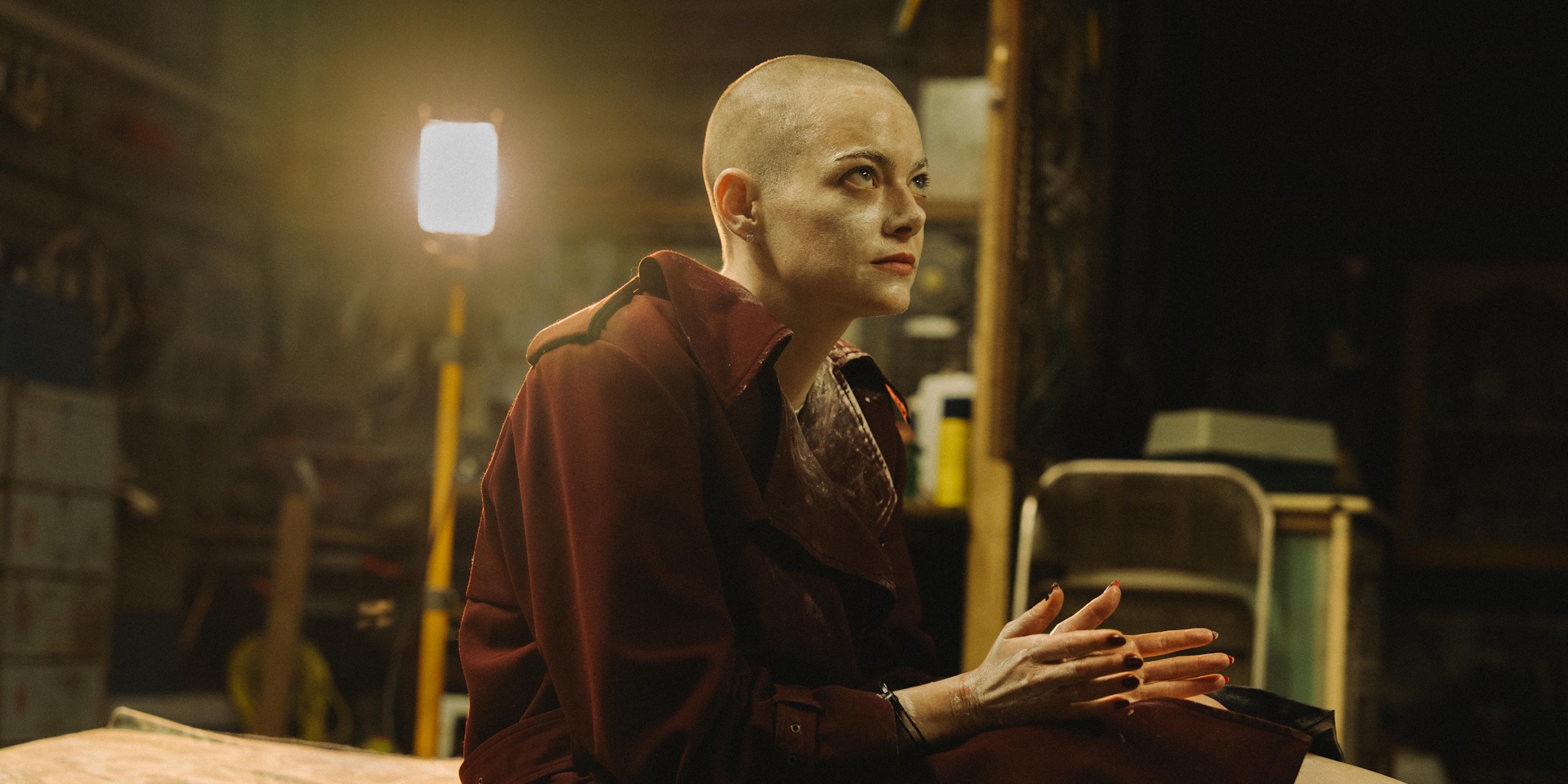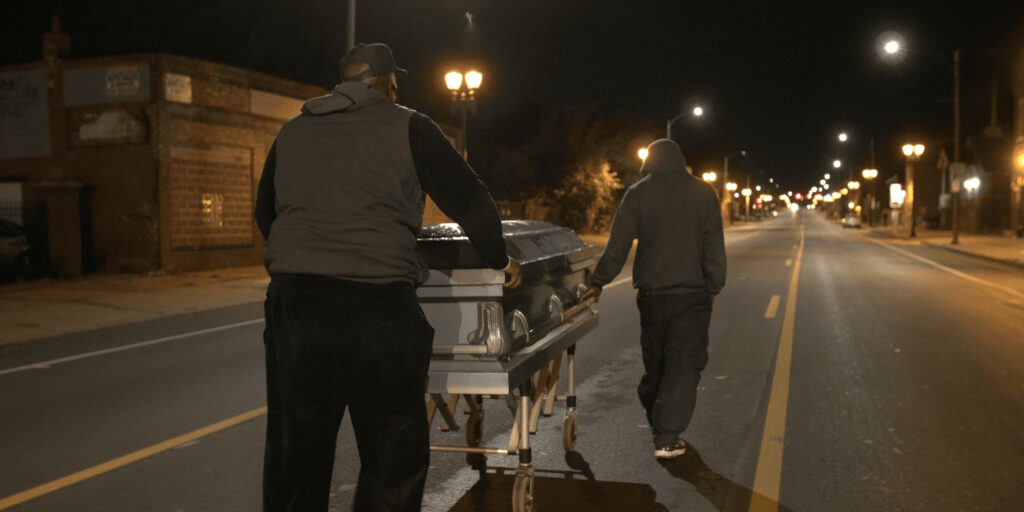Teddy (Jesse Plemons) has a plan. He has done his research. He has procured all the necessary supplies, including padlocks, steel cables, and bulk quantities of antihistamine cream. He has carefully prepared the secluded, small-town home where he currently raises honeybees and lives with his low-functioning, neurodivergent cousin Don (autistic actor Aidan Delbis). The pair of them have trained for their mission. They have talked through possible scenarios and complications. They have cleared their minds of all potential distractions, most startlingly by subjecting themselves to chemical castration. Teddy cajoles his cousin into this and other extreme measures with the soft-spoken self-assurance of a true believer. He knows there is no room for error or compromise when confronting a powerful and terrible evil.
The villain in question is Michelle Fuller (Emma Stone), the young, hotshot CEO of the biomedical/chemical company Auxolith. Teddy’s accusations against Michelle go beyond the usual docket of corporate malfeasance and billionaire sociopathy. Yes, Auxolith is systematically decimating the planet’s ecosystem, including the bees that Teddy tends with such gentle mindfulness. Yes, the company’s insatiable hunger for growth and profits has locked communities like Teddy’s into a death spiral of menial, hazardous wage slavery. And, yes, Teddy has a secret, more personal grievance with Auxolith, whose defective drug rehabilitation treatments put his mother (Alicia Silverstone) into an irreversible coma.
However, as Teddy methodically explains to Don, their mission is about something much bigger than workaday human evil. What exactly that means doesn’t become apparent until about 20 minutes into director Yorgos Lanthimos’ darkly comedic psychological thriller Bugonia. By that point, the cousins have assaulted, drugged, and abducted Michelle just outside her modernist mansion. (With some difficulty, due to her fitness routine and daily Krav Maga training.) When Michelle awakens, she is chained to a mattress in Teddy’s basement. Her head has been shaved, and her skin has been slathered in anti-itch cream. Her confusion quickly gives way to fear, and then to confusion again when Teddy insists that his intentions are nothing so banal as rape or ransom.
Betraying a twinge of satisfaction, Teddy reveals that he knows Michelle’s secret: She is an Andromedan double agent, sent to enslave humanity via her species’ insidious, sophisticated methods of societal and pharmacological control. He demands that she confess her intergalactic crimes, signal her imperial mothership, and help negotiate an end to the Andromedan colonization of Earth in three days’ time. Michelle, for her part, doesn’t even know how to respond to such an accusation. Teddy is, in a sense, her perfect nemesis. The girlboss composure and velvet-glove management style that serve her so well in the corporate world are toothless against this level of conspiratorial delusion.
The fertile psychological perversity of Bugonia’s central dynamic – the unstoppable force of oligarchic control versus the immovable object of fact-denying brain rot – is the most conspicuous feature that distinguishes this remake of the low-budget South Korean comedy Save the Green Planet! Writer-director Jan Joon-hwan’s 2003 film is goofier, sadder, and more explicitly indebted to the American and Korean genre cinema of the 1980s and ’90s. For the remake, writer Will Tracy (Succession, The Menu) capably tweaks the screenplay in a manner that suits Lanthimos’ cooler (but no less absurd) sensibilities.
Savvy viewers will likely be anticipating a big-swing science-fiction reveal, but Bugonia is a more intriguing specimen than a mere delivery device for plot twists. Lanthimos is focused on the sweaty, first-order tension of the film’s captivity scenario – How will Michelle extricate herself from this ridiculous situation? – as well as its broader thematic resonance. Privileging the pointed over the didactic, the filmmaker keeps his audience’s sympathies pleasingly off-balance. We are naturally inclined to revile the narcissistic, buzzword-spouting CEO and identify with a hard-luck everyman like Teddy, despite his greasy mien and crackpot fantasies. However, Michelle’s terrified frustration is palpable as she cycles desperately through unsuccessful persuasion tactics. She is keenly aware that she is a woman wholly in the power of two armed, mentally unstable men with a laundry list of (not unjustified) grudges against wealthy corporations, and against Auxolith and her specifically.
Yet those resentments are couched in a syncretic fantasy of pop-culture influences, niche conspiracies, and personal mythology that cannot be reconciled with reality. It becomes increasingly apparent to Michelle that no profession of innocence or false confession will satisfy her captors. Indeed, the most urgent question that the film poses is not whether Teddy’s cartoonish claims are true. Rather: How does one have a conversation (let alone conduct a negotiation) when the parties involved can’t even agree that the sky is blue and water is wet?
Stone is now seven years and four feature films into her excellent artistic collaboration with Lanthimos, who discerned the latent oddball lurking within the winning romantic lead of films like Easy A (2010) and La La Land (2016). Here she delivers a characteristically precise and exhilarating whole-body performance that plays like the inverse of her Oscar-winning turn in Poor Things (2023). It invites the viewer to find the seams in the almost-perfect skinsuit worn by this amoral, reptilian despoiler (and possible extraterrestrial). Stone’s canny and nuanced deployment of her million-watt, A-list smile is crucial here. Michelle beams with moisturized insincerity and a transparent eagerness to say the right words that will appease, deflect, or intimidate her captors.
Like his co-star, Plemons is an actor of remarkable range, capable of credibly inhabiting earnest sweethearts (The Power of the Dog), blank-eyed psychopaths (El Camino), and everything in between. Bugonia provides him with a sharply drawn underdog role that he packs with off-putting details and frazzled ambiguity. Every sympathetic jot of Teddy’s characterization – his sincere love for Don, his traumatic past, his righteous indignation – is counterbalanced by his ineptitude and the frightening volatility of his delusions. Michelle’s flat denials and C-suite doublespeak quickly undercut Teddy’s composed façade, inciting him to escalating incidents of exasperated violence. Delbis, meanwhile, provides the story with a dose of straightforward humanity, as Don visibly wrestles with the tension between his bighearted devotion to Teddy and his growing distaste for the cruelties they inflict on their captive. (Michelle, of course, discerns this rift and attempts to exploit it.)
Bugonia is essentially a three-hander, the meatiest supporting performance being a nosy sheriff’s deputy (Stavros Halkias) who lurks around, creepily pestering Teddy for reasons that have more to do with their grubby personal history than with a missing CEO. Consequently, Lanthimos and cinematographer Robbie Ryan bestow the film with a claustrophobic, horror-adjacent atmosphere that emphasizes the goo-thick tension of the characters’ epistemological stalemate. The film employs tight close-ups in a manner that is atypical for the director, often shooting Stone from a high angle and Plemons from a low one – although the actual power dynamic at play is not always so clear-cut from moment to moment.
Like Ari Aster’s recent (and more politically provocative) feature, Eddington, Lanthimos’ latest work is fascinated by the deep, seemingly irreconcilable divisions in American society, both ancestral and new-ish. It’s not just that Teddy and Michelle come from utterly different worlds, class-wise. Teddy no longer speaks a language that Michelle even recognizes, his aimless outrage over economic and ecological devastation filtered through a distorted worldview. How, the film implicitly asks, can one debate tax policy with people who insist that the Earth is flat, Tylenol causes autism, or Helen Keller wasn’t a real person? The outlandishness of Teddy’s beliefs distinguishes them somewhat from real-world fringe politics, and he claims to have speed-run his way through the entire alt-ideology spectrum on his way to uncovering the Truth. However, is believing in secret Andromedan colonists all that different from believing that literal demons have a hand in American politics?
Mind you, the potential readings of Bugonia as a satire about the rise of an unreality-based community are complicated by the film’s obvious contempt for faux-progressive plutocrats like Michelle – as well as its coy indulgence of the idea that Teddy may be right about the Andromedans and their nefarious designs for Earth. The result is a film that is shockingly bleak in the final analysis, positing that humanity’s slow slide into apocalyptic ruin is both irreversible and wholly deserved, given how we have treated one another and our planet. Few images that Lanthimos has created to date have approached the ecstatic mingling of absurdity, despair, and liberation in the searing final shot of Dogtooth (2009), but the conclusion of Bugonia perhaps comes closest. A cheeky dollop of tactile sci-fi weirdness that nods at the likes of Tobe Hooper and Quentin Deupieux, it culminates in the darkest, funniest, and most bizarrely uplifting montage of 2025. It’s an achievement that says less about the filmmakers than the singular, despondent nihilism of our present moment, in which any release from this armed madhouse looks pretty nice.
Bugonia opens in select theaters on Friday, Oct. 24, and widens to additional theaters on Friday, Oct. 31.




